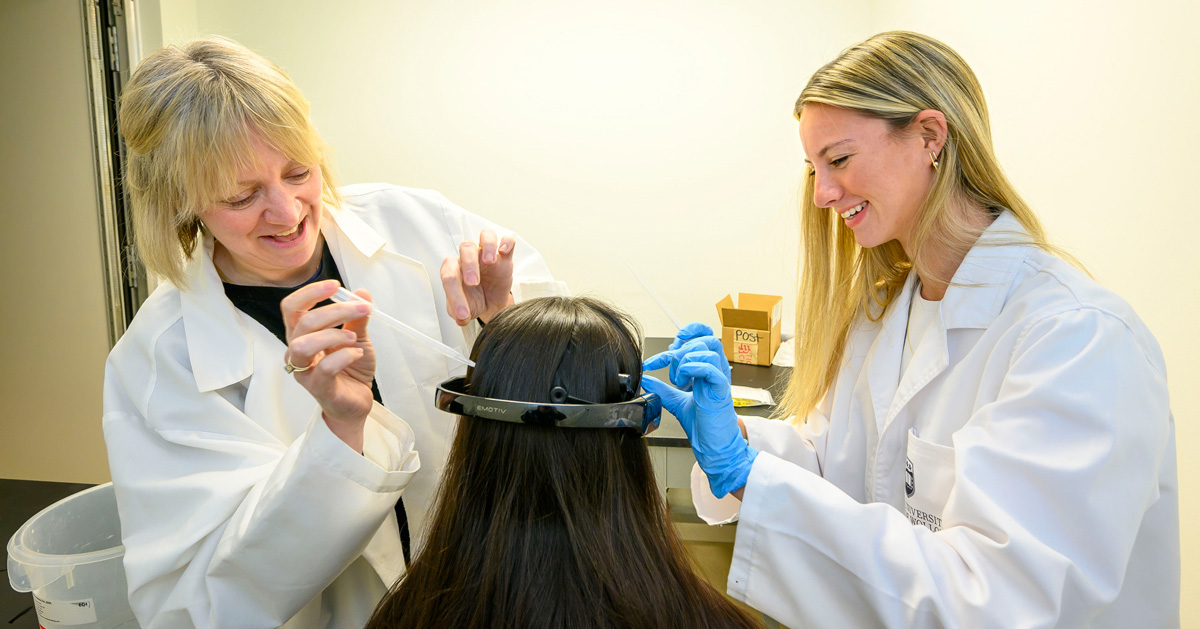Professor’s passion for discovery fuels student success

“I love that moment of discovery,” said Katherine Eskine about the most fulfilling aspect of her role as a Wheaton College professor. “Watching someone figure something out, that ‘a-ha’ moment on their face; I don’t think life gets better than that.”
The associate professor of psychology has witnessed numerous such breakthroughs and she has experienced them herself. A member of the faculty since 2016, Eskine operates a research lab, where she is assisted by 4–8 students each semester and thrives in facilitating the thrill of discovery in others. “It’s such a privilege,” she said.
Last year, two of her mentees, Katie Lanni ’25 and Marguerite Bartlett ’25, received highly competitive Psi Chi Undergraduate Research Grants to help fund their research projects. The classmates were among just 28 Psi Chi Grant recipients nationwide in 2024–25.
Lanni explored the role that listening plays in a person’s executive functioning (the skills used to make plans, solve problems and adapt to new situations). She is pursuing a doctorate in occupational therapy at Tufts University.
Bartlett investigated the neurological connections involved in stress responses after listening to music and is enrolled in Georgetown University’s M.S. program in integrative science.
Both students’ projects reflect Eskine’s primary area of research: music and cognition. They join a growing roster of students with whom she has worked as a professor, a thesis mentor or a collaborating author. Several of her former students have published their research in either professional publications or undergraduate journals.
“This type of experience helps students realize the work involved and provides a stepping stone to a career path,” she said.
In her current research, Eskine is collecting data for a project analyzing the effect of music on behavior. “I believe that listening to music makes it easier to make far-reaching, looser connections on the right side of our brain, which, when parallel-processed with your very detailed, language-focused left side of the brain, gives you a little bit of an advantage. My current study is testing that hypothesis.”
Using electroencephalography (EEG) to record post-processing during the study will enable Eskine to analyze occurrences on each side of the brain, she said, noting that the study will conclude this fall.
In addition to her work, Eskine partners with other investigators as well. Most recently, she collaborated with several members of the Augusta University, Medical College of Georgia, among others, to publish an article in the January 2025 issue of Pediatric Emergency Care.
“We had some interesting findings,” she said. “One of which is, if you use a calibrated measure of body temperature, it’s easier to categorize how serious the emergency is for each child.”
She is also involved in a German study titled Muse-G, working with a group of researchers who collect survey data from five continents.
“I ask people what music they listen to for inspiration, because one of the big debates in the field is how preference influences the effects of music,” Eskine shared.
She has already found some differences between the sexes and among individuals from different continents. “For instance, I could listen to Bob Marley all the time, but others don’t like it,” she said. “So how you feel about the music can change how it affects you.” Eskine will work on that project while on sabbatical during the Spring 2026 semester.
When she returns for the 2026–27 academic year, Eskine looks forward to mentoring more students for their senior theses. She said, “I already have two students lined up.”
—By Troy Watkins
